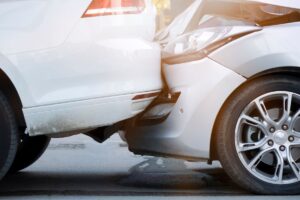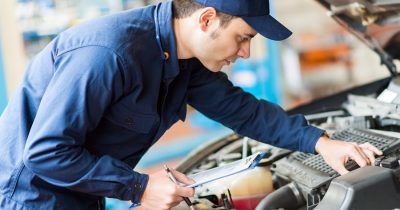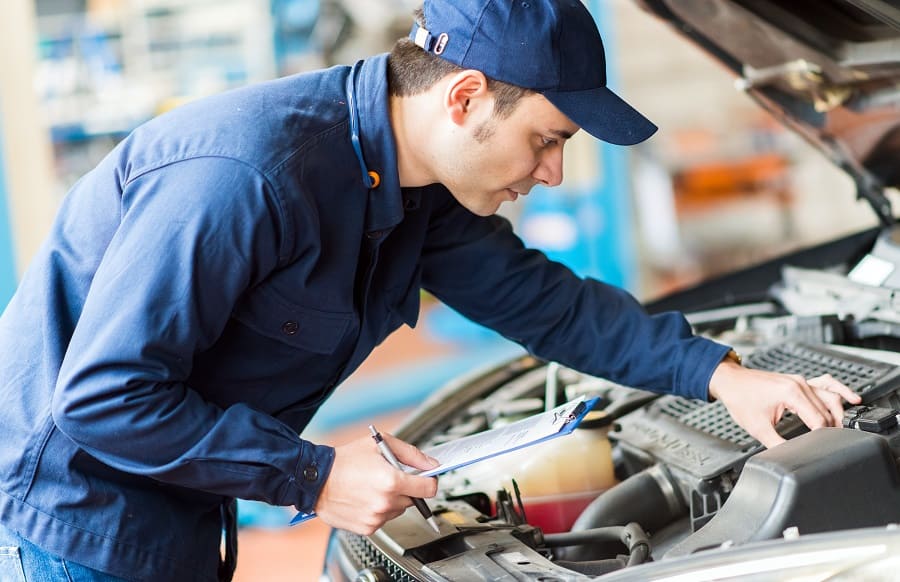As a fleet manager, you are faced with the important task of ensuring that vehicles undergo regular UVV inspections. But what exactly is behind this test and what aspects should you bear in mind? In this article, you will learn everything you need to know about the UVV inspection of company cars in the fleet. From the importance of the test to the DGUV regulations (DGUV regulation 70). We support you in organizing your fleet safely and in compliance with the law.
Contents
What is the UVV inspection of cars in the fleet?
The UVV inspection of cars is a crucial part of fleet management. It serves to ensure both road safety in general and the operational safety of your fleet vehicles. During this regular inspection, your vehicles are checked for compliance with legal requirements and regulations. The aim is to identify and eliminate potential sources of danger in order to ensure the safety of your drivers and other road users at all times. The UVV inspection is therefore an important point to ensure the smooth and safe operation of your company car fleet.
What is checked during a UVV inspection of company cars in the fleet?
During an accident prevention inspection of company vehicles in the fleet, various vehicle components and systems are checked to ensure road safety and operational safety. These points may vary depending on the vehicle type and specific requirements. A regular and careful inspection ensures a safe and reliable vehicle fleet in your company. Here are the 10 most important points that are checked as part of a UVV inspection of passenger cars:
- Lighting: Checking the functionality of headlights, rear lights, indicators and other lighting equipment.
- Brakes: Check the braking performance and condition of brake pads, brake discs and brake lines.
- Tires: Check for sufficient tread depth, correct air pressure and general condition of the tires.
- Steering: Check the steering for proper function and play.
- Bodywork: Check for damage, cracks or other defects on the vehicle bodywork, including the load/transport structure.
- Vehicle safety systems: Checking the functionality of airbags, seat belts, ABS (anti-lock braking system) and ESP (electronic stability program).
- Electrical system: Check the battery, starter, alternator and wiring and all electrical components in the vehicle.
- Warning triangle and first aid kit: Check that this safety equipment is present and complete in the vehicle.
- Fluid levels: Check oil level, coolant, windshield wiper fluid and other fluids.
- General equipment: Inspection of warning devices, warning lights, rear-view mirrors, windshield wipers, fire extinguishers and other safety equipment.
Download UVV car inspection checklist
Laden Sie sich hier unsere UVV Prüfung Pkw Checkliste als PDF kostenfrei herunter.
"*" indicates required fields
Who carries out the UVV inspection of company cars in the fleet?
The accident prevention regulations (UVV inspection) are mandatory and are designed to make your fleet safer. As fleet manager, you are responsible for the proper implementation of UVV inspections for all vehicles used in your fleet. It is important that the fleet management regularly carries out or has a UVV inspection carried out in accordance with the accident prevention regulations in order to identify and eliminate safety risks.
As soon as the vehicle inspection (e.g. by Dekra) has been completed, you as the person responsible for the fleet in the company must document the results of the inspections and report them to the relevant authorities. UVV inspectors help to make the fleet safer and minimize accident risks – but it is up to you as fleet manager to ensure the condition of the vehicles.
The most common options for UVV testing
- External testing organizations: External testing organizations include, for example, TÜV (Technischer Überwachungsverein) or Dekra (Deutscher Kraftfahrzeug-Überwachungsverein). TÜV and Dekra have the necessary expertise, technical equipment and personnel to carry out UVV inspections independently and properly.
- External experts: External experts with the appropriate approval can also carry out the UVV inspection of company cars. These experts are either employed by testing organizations such as TÜV and Dekra or work as freelance experts.
- In-house specialists: In larger companies with their own fleet management, in-house specialists such as workshop employees or safety officers can carry out the UVV inspection. These persons must have the necessary specialist knowledge for vehicle testing and the corresponding training.
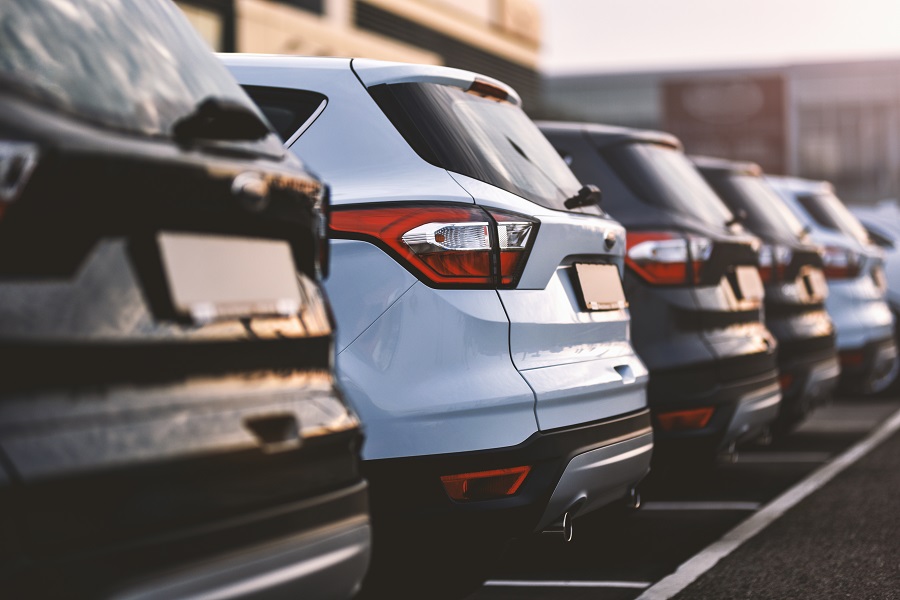
Is a UVV inspection of company cars mandatory by law?
The UVV inspection of company cars is required by law and regulated in DGUV regulation 70. The inspection (also vehicle inspection) in accordance with DGUV regulation 70 applies to all mechanically driven land vehicles not tied to rails and their trailers. This includes cars and vehicles such as cars, trucks, buses, construction machinery, agricultural vehicles and other types of vehicles used in a business. Special vehicles, such as those used by the fire department or ambulance services, are also subject to the requirements of DGUV Regulation 70 Vehicles.
This covers all important aspects of vehicle testing that are relevant to the use of vehicles in operation. This includes the design and equipment of the vehicles, their safe use and the inspection of their functionality and safety. It also contains information on how violations can be punished. The exact requirements and inspection intervals may vary depending on the type of vehicle, intended use and legal regulations. As a rule, vehicles must undergo a UVV inspection at least once a year.
Free guide
In our guide, you can find out more about keeper liability in the vehicle fleet – from the legal basis to the most important obligations.
Daily vehicle inspection before driving: UVV inspection of company cars by drivers
Pursuant to § 36 para. 1 of DGUV Regulation 70, all drivers are obliged to check the vehicle for road safety before starting work. The daily vehicle check, also known as the “pre-departure check” or “vehicle check”, is an important measure for detecting potential defects or problems at an early stage and ensuring safety while driving. This involves a simple visual inspection of the vehicle, taking into account external damage, the condition of the tires, the lights, the brakes, the windscreen wipers, the fluid levels, warning notices on the dashboard and other safety-related aspects.
Daily vehicle inspections by drivers enable potential safety risks to be identified and appropriate measures to be taken. If defects are identified, they should be reported immediately to the relevant departments in the company so that repairs can be carried out quickly or the vehicle can be temporarily taken out of service. Through these regular checks and inspections, each individual contributes to minimizing the risk of accidents and ensures the safety of all road users.
Our conclusion on the UVV inspection of company cars in the fleet
A safe vehicle fleet is of great importance for every company. One of the most important duties here is to instruct employees in accordance with the accident prevention regulations (UVV) for vehicles and drivers. DGUV Regulation 70 lays down the rules for safety in the workplace (as in cars) in the vehicle fleet and regulates all essential topics that are important for the operational use of vehicles. This includes the construction and equipment regulations, safe operation, checking the functionality and safety of the vehicle as well as information on the punishment of administrative offenses.
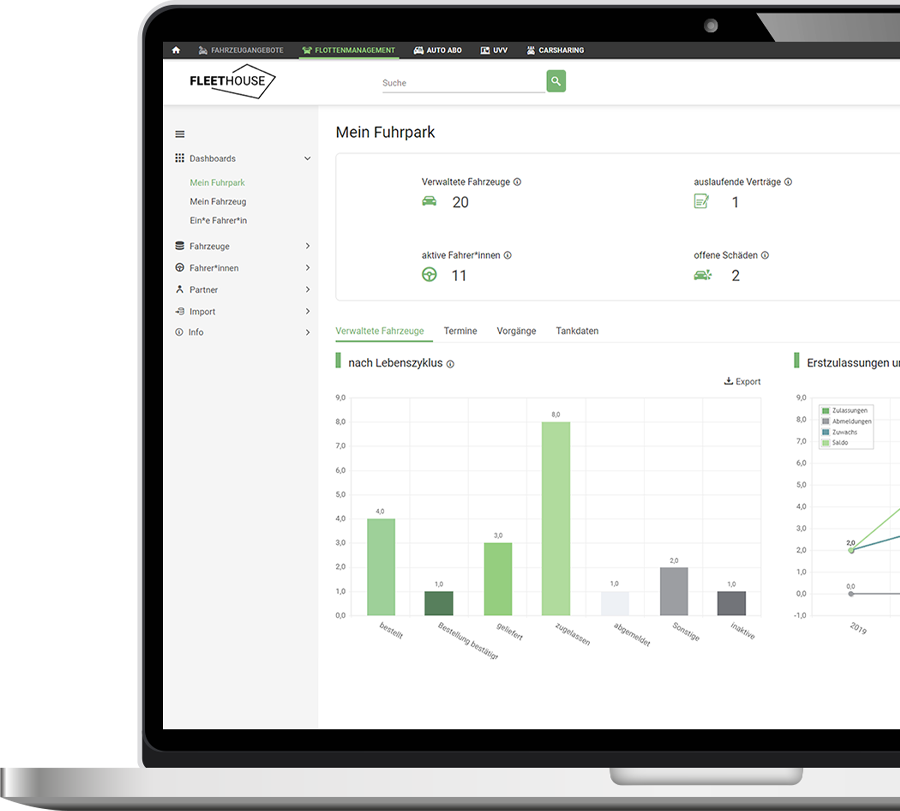
The most important facts about the UVV inspection for vehicle fleets at a glance
During UVV inspections, various components, systems and the condition of the vehicle are checked. Regular and careful inspection of these points ensures a safe and reliable vehicle fleet.
The UVV inspection is anchored in DGUV regulation 70 and must be carried out at least once a year, or more frequently if necessary.
The UVV inspection can be carried out by external inspection organizations such as TÜV or Dekra, by external experts or by the company's own specialists.
Further Fleet Knowledge
If you liked this article and would like to know more about this topic, we recommend these articles.

Claims management: The 1×1 for fleet managers

